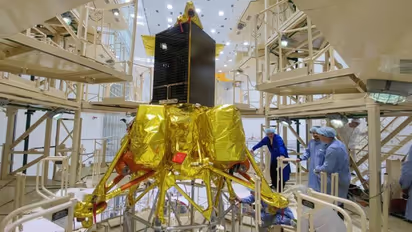Russia's Luna-25 launch: Far east village to be evacuated for 1st lunar lander mission in over 40 years

Synopsis
The Luna-25 lunar lander, Russia's first since 1976, will be launched from the Vostochny Cosmodrome on August 11, some 3,450 miles (5,550 km) east of Moscow.
On August 11, Russia will evacuate a village in its far east to facilitate the launch of its first lunar lander mission in nearly half a century, as announced by a local official on Monday. The upcoming mission, called Luna-25, marks Russia's return to lunar exploration after a hiatus since 1976. The lunar lander will be launched from the Vostochny Cosmodrome, located approximately 3,450 miles (5,550 km) east of Moscow, as per Russia's space agency, Roscosmos.
The evacuation is necessary as a safety measure for the residents of the Shakhtinskyi settlement in Russia's Khabarovsk region, which is situated southeast of the launch site. The village falls within the predicted area where the rocket boosters will fall after they separate from the spacecraft. To ensure the residents' safety, they will be evacuated in the early morning of August 11.
According to Alexei Maslov, the head of the Verkhnebureinskyi district in the Khabarovsk region, several locations, including the mouth of the Umalta, Ussamakh, Lepikan, Tastakh, Saganar rivers, and the area of the ferry crossing on the Bureya River, are within the predicted fall zone of the rocket boosters.
Luna-25 will be launched using a Soyuz-2 Fregat booster and is planned to become the first lander to reach the South Pole of the moon, as per Roscosmos' statement. The primary objectives of the mission are to develop soft-landing technologies, conduct research on the Moon's internal structure, and explore potential resources, including water.
Once it lands on the lunar surface, the lander is expected to operate for one year, conducting various scientific and exploratory missions on the Moon. The mission represents a significant milestone for Russia's space exploration program and holds the potential for crucial advancements in lunar research and future missions.
Check the Breaking News Today and Latest News from across India and around the world. Stay updated with the latest World News and global developments from politics to economy and current affairs. Get in-depth coverage of China News, Europe News, Pakistan News, and South Asia News, along with top headlines from the UK and US. Follow expert analysis, international trends, and breaking updates from around the globe. Download the Asianet News Official App from the Android Play Store and iPhone App Store for accurate and timely news updates anytime, anywhere.